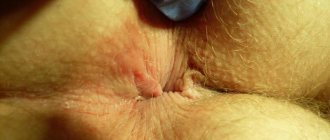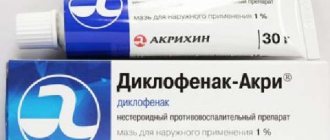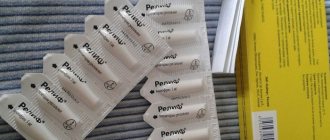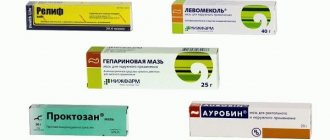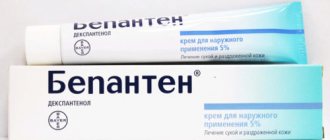Heparin ointment for hemorrhoids has been used for decades. During all this time, it has managed to establish itself as an inexpensive, reliable remedy that helps to quickly alleviate a person’s condition and significantly shorten the period of exacerbation. Therefore, today this drug is produced by almost every pharmaceutical company.
Composition of the drug
The composition of heparin ointment includes the following substances:
| Substance | pharmachologic effect |
| Heparin | Dissolves blood clots formed in blood vessels |
| Benzyl nicotinate | Has a local vasodilator effect |
| Benzocaine | Serves for local anesthesia |
| Distilled glycerin, stearin, refined corn oil | They are a neutral base for medicinal ointments. |
The simple composition of the cream may raise a natural question: Does this heparin ointment help with hemorrhoids? This can be judged by the analysis of its active substances. The drug is produced in plastic tubes or in tubes made of aluminum foil containing 10–25 mg of active substance. The medicine should be stored in a cool place, protected from sunlight.
Heparin ointment for hemorrhoids: pharmacological action
Prolapsed hemorrhoidal node
The main active component of the ointment is heparin. This substance prevents thrombus formation and resolves already formed blood clots. Thus, heparin eliminates the cause of hemorrhoidal cones and restores blood flow in the thrombosed vessel.
The second component - benzyl nicotinate expands the capillaries of the mucous membrane, which promotes better absorption of the drug in the area of its application. The anesthetic Benzocaine has a local analgesic effect, which leads to the rapid elimination of pain. One package of heparin ointment for hemorrhoids is usually enough for the entire period of exacerbation.
Description of the drug
Heparin ointment is a local remedy that affects metabolic processes in tissues and blood clotting. It has an anticoagulant, anti-inflammatory, analgesic effect. It is successfully used in proctology to treat painful symptoms and prevent the formation of hemorrhoids.
Heparin ointment for hemorrhoids has a powerful antiseptic effect and is used to relieve symptoms and treat the disease
The drug is produced in the form of a white ointment with a gel structure, practically odorless. Packaged in standard factory tubes of 10 g and 25 g. Stored at room temperature, in a dry and dark place, for 3 years. Available without a prescription in all pharmacies.
The drug is a combination drug containing three active ingredients:
- sodium heparin – 100 units per 1 g ointment;
- benzocaine – 0.04 g;
- benzyl ester of nicotinic acid (benzyl nicotinate) – 0.0008 g.
An ointment substance in an amount of up to 25 g is used as a base. All components of the ointment actively interact with each other, quickly eliminating the painful symptoms of hemorrhoids.
Heparin ointment for hemorrhoids is considered one of the most effective antihemorrhoidal agents in the treatment of both chronic and acute pathological conditions. Approved for use at almost any age, but only as prescribed by a doctor.
Indications for use
To understand the effect of heparin ointment for hemorrhoids and how to use it, you should consider the classification of the disease.
Hemorrhoids
Hemorrhoids are divided into three types:
- interior;
- outer;
- combined.
First, a little about the anatomy of the rectum. This knowledge is necessary to understand how to properly use heparin ointment for hemorrhoids. The rectum has three sections. The internal section, occupying its upper third, is lined with cubic intestinal epithelium. The outer section is covered with stratified squamous epithelium, similar to skin, and passes into the anus. The middle section is located on the border of the upper and lower thirds.
In the case where the vessels of the upper part of the rectum are affected, hemorrhoids are called internal. If the vessels of the lower third are subject to painful changes, the nodes are located in the anal canal and outside. This form of hemorrhoids is called external. In cases of combination they speak of combined hemorrhoids. Heparin cream is more often used for external localization of nodes. You can use it for internal and combined forms of the disease along with medicinal suppositories.
Use during pregnancy
Heparin ointment during pregnancy is used only after consultation with your doctor.
Pregnancy is a special period in a woman’s life. The growing fetus puts pressure on the organs, preventing feces from moving normally through the intestines. Hemorrhoidal bumps appear. At this time, taking any medications should be done with caution, because we are talking about the health of mother and baby.
Depending on the stage of pregnancy, the ointment can be used before and after childbirth. But it is imperative to consult a clinic. The drug has minimal side effects. Gives excellent and fast results.
The method of application is the same as described above. If undesirable manifestations occur, an immediate visit to your doctor is required.
The real scourge of our time, hemorrhoids, requires treatment in the early stages. Until it comes to complications and surgical intervention, you can use external medications. Heparin ointment is a product that has proven itself on the positive side. Efficiency, ease of use, affordable prices, short course of administration - the advantages of this ointment are obvious.
THERE ARE CONTRAINDICATIONS CONSULTATION WITH YOUR DOCTOR IS REQUIRED
Author of the article Alexey Alexandrovich Egorov, proctologist
When use is prohibited
Most medications used to treat hemorrhoids are usually harmless. This definition does not quite apply to hemorrhoid ointment with heparin. Its active substance, heparin, prevents the formation of blood clots, as people say, “thin the blood.” Such a decrease in coagulability may be contraindicated in a number of diseases and pathological conditions.
The use of heparin is contraindicated in:
be careful
- frequent rectal bleeding;
- large anal fissures;
- acute and chronic stomach ulcers;
- liver cirrhosis;
- hypertension.
For rectal bleeding, such an ointment will increase its duration and abundance, which can lead to dangerous blood loss. In the case of deep rectal cracks, when applying the ointment, they bleed, which prevents further healing. Diseases such as stomach ulcers, liver cirrhosis and hypertension are often complicated by bleeding. Blood thinning can provoke these dangerous conditions. For this reason, treatment with heparin in such patients requires mandatory consultation with a doctor.
Adverse reactions and compatibility
Checking for an allergic reaction
The use of heparin ointment for external hemorrhoids usually does not cause adverse reactions. However, you should remember the possibility of individual intolerance to the drug. In rare cases, side effects such as redness of the skin, itching, local allergies in the form of urticaria are possible.
To prevent these phenomena, you must initially test tolerance on an easily accessible area of the skin. To do this, apply a small amount of the drug to the forearm. If no rash, persistent redness or burning sensation appears in this area within two hours, the medicine can be used. Otherwise, you must contact your doctor to change your prescription.
How is hemorrhoids treated with heparin ointment?
Healing ointment
Before starting treatment, you need to wash the anus area with warm water and soap. The correct position for treatment is lying on your side. This position is most convenient for uniform application of the drug. The ointment consumption is calculated from the proportion of 1-2 grams per area with a diameter of about 4-5 cm. The cream is applied in a thin layer to the affected area, after which it is rubbed in with light circular massaging movements. In the first minutes after application, a burning sensation may occur, which goes away after a few minutes.
This method is most effective for external localization of hemorrhoids. If the nodes are tense or painful due to thrombosis, the ointment should be applied on a gauze pad. To do this, you should take a sterile gauze cloth up to 4-5 cm in size and apply a layer of ointment on it in a layer of up to 0.5 cm. The gauze layer should be thick enough. After the napkin with the medicine is applied to the affected area, it should be secured with an adhesive plaster. These dressings are best used at night. If the gauze swab is used during the day, it must be updated for better contact of the medicine with the affected surface.
When treating internal hemorrhoids with heparin ointment, it is applied to a gauze pad, which is then inserted into the rectum. This type of treatment is best done at night.
In cases of combined locations of hemorrhoids, both lubricant and tampons can be used.
The duration of treatment usually takes from 4 to 14 days.
Warning! The drug should not be applied to the area of anal fissures. This can lead to the absorption of microorganisms into the blood and the spread of infection.
Effect on hemorrhoids
An old proven method in treating hemorrhoids and relieving exacerbations is heparin ointment. The active component of the drug was first obtained from the liver. Its medicinal properties include preventing blood clotting.
Immediately after using the drug, the patient notes a decrease in pain.
There is an outflow of blood from the anus. Heparin cannot completely dissolve a blood clot, but it reduces the ability of cells to stick together. At this moment, the painful process is suspended.
Swelling and redness gradually disappear and congestion is eliminated. The ointment prevents new blood clots from forming.
Excipients have an anti-inflammatory effect and help relieve unpleasant symptoms such as itching and burning.
The drug is available in plastic or metal tubes. It appears in the form of a thick mass of white color with signs of yellowness. Has no smell. The product has shown maximum effectiveness in the treatment of external nodes. Its effect lasts no more than 8 hours. When using heparin ointment in a patient with internal hemorrhoids, caution should be exercised.
Therapy during pregnancy
Expectant mother
Pregnancy is the time when a woman is at greatest risk of developing hemorrhoids. The reason for this is the characteristic anatomical features of the female body. During gestation, the entire pelvic circulatory system undergoes a restructuring and blood flow to the uterus sharply increases. According to some data, in the second half of pregnancy, the body uses up to 25% of all blood to supply blood to the uterus and fetus. Gradually increasing, the uterus, due to pressure on the vessels of the pelvic cavity, impedes venous outflow from the lower extremities and pelvic veins. All this contributes to varicose veins located below, including the veins in the rectum.
Treatment for hemorrhoids during pregnancy should be prescribed by a doctor. The thing is that not all medications are harmless to the unborn child. In this case, heparin ointment is one of the most harmless methods of treatment. Therapy should be selected individually, taking into account the characteristics of the body and the nature of the pregnancy.
You should know how to properly use heparin ointment for hemorrhoids in pregnant women. The fact is that the factors that cause hemorrhoids in pregnant women operate until the very birth. For this reason, it is not enough to eliminate acute symptoms; constant prevention of thrombus formation in the veins of the final intestine is also necessary.
In the external form, pregnant women should apply the ointment three times a day. In cases of internal localization of nodes, the drug is applied on a gauze swab once a day. This use reduces complications such as thrombosis and prevents the formation of new nodes.
Contraindications
To prevent undesirable pathological effects, certain diseases should be excluded before starting therapy. Hemorrhoids are accompanied by constipation, in which dense feces injure the mucous membrane of the rectal wall and affect the hemorrhoids. In these cases, bleeding from the node develops. It is contraindicated to treat the lesion with Heparin ointment; the composition of the product accelerates blood circulation - this will increase bleeding. With hemorrhoids, excessive blood loss is possible, which is dangerous for the patient’s condition. General contraindications:
- individual intolerance to the components of the drug;
- decrease in the number of platelets in the blood;
- vascular thrombosis;
- bleeding of any location;
- purulent processes in the rectum associated with necrotization of hemorrhoids;
- period of menstruation in women;
- hypertonic disease;
- severe deformation of the intestinal mucosa;
- blood clotting disorder.
Special instructions when using Heparin ointment
Absorption of the ointment into the mucous membrane with impaired integrity has an irritating effect, worsens the condition, and prevents the healing of the surface. The presence of a minimal violation of the integrity of the vessel is dangerous due to the development of heavy bleeding, leading to massive blood loss.
On a note! An allergic reaction is caused by intolerance to heparin or auxiliary components. Manifested by swelling, burning, itching at the site of use. You should stop taking the drug and consult your doctor.
Additional recommendations
Indications, method of treatment and possible complications are indicated on the leaflet - insert in the pharmacy box with the tube containing the drug. It outlines what heparin ointment for hemorrhoids is and provides instructions for its use. It should be remembered that most often the duration of treatment does not exceed two weeks. In the case when the ointment is used for a longer period, a test should be carried out from time to time to determine blood clotting. Treatment of hemorrhoids should be carried out under the supervision of a proctologist. Compliance with these simple safety measures will help prevent the possibility of complications.
